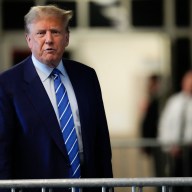WASHINGTON – The White House said Thursday that North Korea’s secret work on a nuclear reactor with Syria was “a dangerous and potentially destabilizing development for the world,” raising doubts about Pyongyang’s promise to disclose its nuclear activities.
Seven months after Israel bombed the reactor, the White House broke its silence and said North Korea assisted Syria’s secret nuclear program and that the destroyed facility was not intended for “peaceful purposes.”
The disclosure could undermine six-party negotiations to try to resolve the nuclear standoff with North Korea.
The White House issued a two-page statement after legislators were given details about the reactor in a series of briefings on Capitol Hill that included a video presentation of intelligence information the administration contends establishes a strong link between North Korea’s nuclear program and the bombed Syrian site.
The briefing also included still photographs that showed a strong resemblance between specific features of the plant and one near Yongbyon in North Korea.
The White House said the International Atomic Energy Agency was being briefed on the intelligence.
While calling North Korea’s nuclear assistance to Syria a “dangerous manifestation” of Pyongyang’s nuclear weapons program and its proliferation activities, the White House said it remained committed to the talks.
The administration said that after the reactor was damaged beyond repair, Syria tried to bury evidence of its existence.
“This cover-up only served to reinforce our confidence that this reactor was not intended for peaceful activities,” White House press secretary Dana Perino said. “The Syrian regime must come clean before the world regarding its illicit nuclear activities.”
The Syrian nuclear reactor destroyed by Israeli jets was within weeks or months of being functional, a top U.S. official told The Associated Press, speaking on condition of anonymity. The official said the facility was mostly completed but still needed significant testing before it could be declared operational.
No uranium, which is needed to fuel a reactor, was evident at the site, a remote area of eastern Syria along the Euphrates River. But the U.S. official said the reactor was similar in design to the North Korean reactor at Yongbyon, which has in the past produced small amounts of plutonium, the material needed to make nuclear weapons.
Syria has maintained in the past that the site was an unused military facility.
Top members of the House of Representatives Intelligence Committee who were briefed on the reactor said it posed a serious threat of spreading dangerous nuclear materials.
“This is a serious proliferation issue, both for the Middle East and the countries that may be involved in Asia,” said Republican Representative Pete Hoekstra of Michigan.
Hoekstra and Intelligence Committee chairman Silvestre Reyes, a Democrat from Texas, told reporters after the closed briefing that they were angry that the Bush administration had delayed informing the full committee for so long.
“It’s bad management and terrible public policy to go for eight months knowing this was out there and then drop this in our laps six hours before they go to the public,” Hoekstra said.
Bush’s failure to keep Congress informed has created friction that may imperil congressional support for Bush’s policies toward North Korea and Syria, he said.
Democratic Senator Joseph Biden of Delaware, chairman of the Senate Foreign Relations Committee, said the revelations make it clear that any deal to eliminate North Korea’s nuclear programs must also stop its proliferation activities and include vigorous verification. But he said the information in the briefings was not a cause to end the talks.
“To the contrary, it underscores the need for pursuing the talks, which remain our best chance to convince North Korea to abandon its pursuit of nuclear weapons and to stop proliferation,” Biden said.
The White House stressed that North Korea’s assistance on the Syrian reactor was an issue of “great international concern.”
“The construction of this reactor was a dangerous and potentially destabilizing development for the region and the world,” Perino said in the statement. “This is particularly true because it was done covertly and in violation of the very procedures designed to reassure the world of the peaceful intent of nuclear activities.
The White House used its statement as an opportunity to denounce the nuclear activities of Iran, which it says is a threat to the stability of the Middle East. Perino said the international community must take further steps, beginning with full implementation of UN Security Council resolutions.
North Korea’s Foreign Ministry said Thursday that it had discussed technical matters with the Americans for moving forward on that and other agreements from the arms talks. “The negotiations proceeded in a sincere and constructive manner and progress was made,” the ministry said in a statement.
As part of that process, the North is required to submit a “declaration” detailing its programs and proliferation activity, but the talks are stalled over Pyongyang’s refusal to publicly admit the Syria connection. However, officials say the North Koreans are willing to accept international “concern” about unspecified proliferation.
Syria has signed an international treaty requiring it to disclose nuclear interests and activity. It has not declared the alleged reactor to the IAEA nor was it under international safeguards.
In the Syrian capital of Damascus, legislator Suleiman Haddad, who heads the parliament’s foreign relations committee, said the videotape did not deserve a response.
“America is looking for any problem in order to accuse Syria,” Haddad said by telephone. “Do we need Korean workers to work in Syria?”
“America is trying to create an atmosphere of war in the region,” Haddad said.















